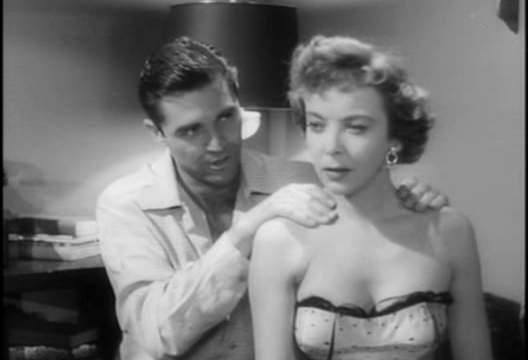Don Siegel’s Private Hell 36 is an odd, compelling misfire. I wouldn’t be surprised to find that many people who have seen it mistakenly remember it as two separate films: “the one where Ida Lupino plays a charismatic nightclub singer who gets conscripted to help the police track down a killer” and “the one with the two cops, the stolen money, and the crisis of conscience.”
The two stories don’t gel. Lupino’s character, the pragmatic (but not quite cold-blooded) Lilli Marlowe, breezily and effortlessly dominates the first two-thirds of the movie; when her new detective boyfriend, Steve Cochran’s Cal (who is so callous he barely blinks at a coworker’s early death) steals the suitcase of counterfeit money Lilli has helped him and Jack, his straight-arrow sweetheart of a partner (Howard Duff), track down, it’s easy to imagine where this is going. Cal may try to sell everyone, himself included, on the idea that he’s done this for Lilli and her expensive tastes, but Lilli has more of a conscience than he does. Even if the theft doesn’t bother her, the moral fallout will.
Lupino turns in a star performance. She’s a magnetic presence, and she has the most complex character, the one whose battle between principles and priorities doesn’t have an immediately obvious outcome. It’s her movie … until the end, when she’s off-screen for the climax and it’s apparently out of sight, out of mind. Don Siegel narrows down the final minutes to a tense but indirect confrontation between slimy Cal, nobly tormented Jack, and a wrench-in-the-works blackmailer. This is, to be fair, the ending prefigured by the film’s title: “36” is the number of the trailer where Cal stashes the money, and this crime really has created Jack’s private hell. But if this is where it was always going, and what the movie always cared about, why have we spent so much time on Lilli? And if it’s Lilli’s movie, why does it lose track of her? There’s an almost-accidental sense of poignancy to her unfinished fate, as we end the movie thinking about her off somewhere, waiting.
Bosley Crowther mentioned the same fundamental problem in his contemporary review, but I give the film more credit than he does. It’s true that the plot, sans Lilli, is slight and too obvious, but Lilli doesn’t feel like an ego-driven interruption to me, one Lupino’s behind-the-scenes roles let her shoehorn in. She feels messy, lively, and memorable, elevating the movie as much as she warps it. With her involvement, the movie isn’t neater, and it isn’t conventionally better, but it may be greater. She’s certainly one of the big reasons it’s still worth watching.
Private Hell 36 is streaming on Tubi.

